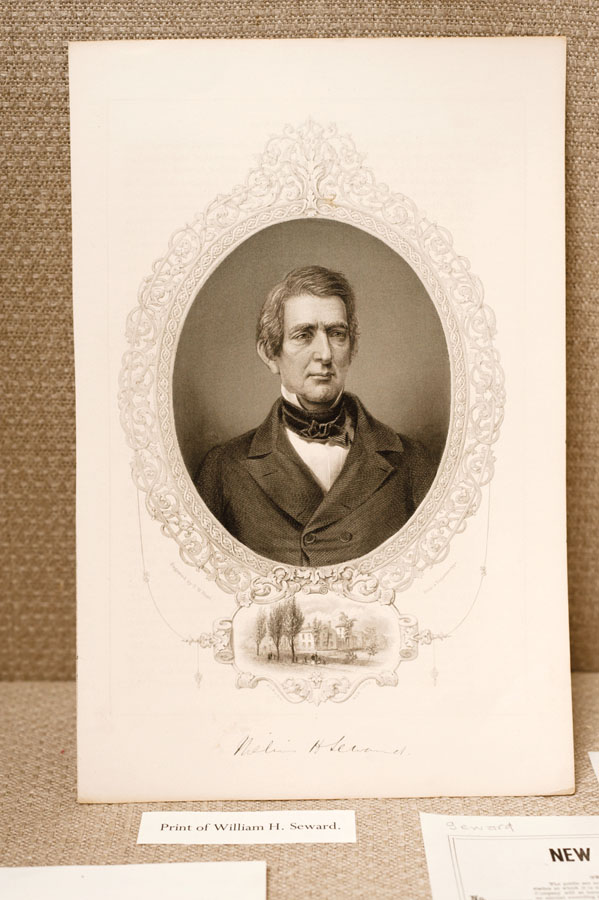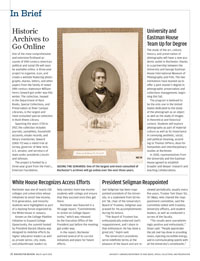In Brief
 SEEING THE SEWARDS: One of the largest and most-consulted of Rochester’s archives will go online over the next three years. (Photo: University Libraries/Department of Rare Books, Special Collections, and Preservation)
SEEING THE SEWARDS: One of the largest and most-consulted of Rochester’s archives will go online over the next three years. (Photo: University Libraries/Department of Rare Books, Special Collections, and Preservation)One of the most comprehensive and extensive firsthand accounts of 19th-century American political and social life will soon be available online. A three-year project to organize, scan, and create a website featuring photographs, diaries, letters, and other papers from the family of noted 19th-century statesman William Henry Seward got under way this winter. The collection, housed in the Department of Rare Books, Special Collections, and Preservation at River Campus Libraries, is the largest and most-consulted special collection in Rush Rhees Library.
Spanning the years 1730 to 1917, the collection includes journals, pamphlets, household accounts, estate records, and library inventories. Seward (1801–72) was a noted trial attorney, governor of New York, U.S. senator, and secretary of state under presidents Lincoln and Johnson.
The project is funded by a three-year grant from the Fred L. Emerson Foundation.
University and Eastman House Team Up for Degree
The study of the art, culture, history, and preservation of photography will have a new academic outlet in Rochester, thanks to a partnership between the University and George Eastman House International Museum of Photography and Film. The two institutions have teamed up to offer a joint master’s degree in photographic preservation and collections management, beginning this fall.
The program is believed to be the only one in the United States dedicated to the study of the photograph as an object as well as the study of images in theoretical and historical context. Students will explore photography as part of material culture as well as its importance in conveying aesthetic, social, and political meaning, according to Thomas DiPiero, dean for humanities and interdisciplinary studies at Rochester.
In 2010, representatives from the University and the Eastman House agreed to establish broader and deeper research and teaching collaborations.
White House Recognizes Access Efforts
Rochester was one of nearly 150 colleges and universities whose initiatives to enroll low-income, first-generation, and minority students were highlighted as part of a daylong forum organized by the White House in January.
Known as the College Pipeline Initiative to Expand College Opportunity, the summit hosted by President Barack Obama was designed to mobilize efforts by higher education leaders as well as private sector, city, state, and philanthropic leaders to help connect more low-income students with college and ensure that they succeed once they get there.
Rochester was featured in a 90-page report, “Commitments to Action on College Oppor-tunity,” which was released by the Executive Office of the President just before the meeting got under way. In the report, Rochester outlined several of its current initiatives and plans for future efforts.
President Seligman Reappointed
Joel Seligman has been reappointed president of the University. In a statement from Ed Hajim ’58, chair of the University’s Board of Trustees, Seligman was praised for his accomplishments during his tenure.
“The Board of Trustees has enthusiastically endorsed Joel’s reappointment, and I share in that enthusiasm. He has done a great job,” Hajim said.
The University’s presidents serve indefinite terms at the pleasure of the board and are reviewed periodically, usually every five years. Trustee Tom Sloan ’65, ’67 (Mas), who chaired the reappointment committee, said the committee talked with trustees, University officers, and student leaders, as well as conducted a survey of the faculty.
“The results were overwhelmingly positive and enthusiastic,” Sloan said. “People appreciate the job Joel has done in providing vision, injecting incredible energy, and in communicating openly with all the University’s constituents.”
 UR MEDICINE: A new branding campaign highlights Rochester’s broad range of clinical services. (Photo: Medical Center Public Relations)
UR MEDICINE: A new branding campaign highlights Rochester’s broad range of clinical services. (Photo: Medical Center Public Relations)Introducing ‘UR Medicine’
Taking a page from the playbook of successful corporate brands, the University has introduced a new name for its fast-growing clinical network. The name—UR Medicine—is intended to better capture the breadth of patient care services that the University’s clinical units deliver across all affiliated institutions and collaborative programs.
The new identity will be used to brand all aspects of the patient care network, including Strong Memorial Hospital (along with its components Golisano Children’s Hospital, Wilmot Cancer Center, Flaum Eye Institute, Strong West, and others), Highland Hospital, Thompson Health, Eastman Dental, the Highlands at Brighton, the Highlands Living Center, and the University of Rochester Medical Faculty Group.
The new brand name was introduced with television commercials that were broadcast locally during the Super Bowl and the Olympics. To see the ads and for more about the new identity, visit www.urmedicine.org.
Jim Thompson Named Special Counsel
 ADVANCEMENT: Thompson oversaw the launch of Rochester’s Meliora Challenge. (Photo: University Communications)
ADVANCEMENT: Thompson oversaw the launch of Rochester’s Meliora Challenge. (Photo: University Communications)Jim Thompson, who has served as the University’s chief advancement officer since 2005, has been appointed special counsel to President Joel Seligman.
Thompson will advise Seligman on the future development of alumni relations and advancement as the $1.2 billion Meliora Challenge nears its conclusion.
“Jim has built an outstanding Advancement program and team. Working with our Board of Trustees, Jim took the initiative in developing an ambitious strategic and implementation plan that today is well ahead of schedule for virtually every area addressed in this plan,” said Seligman, citing the success of the George Eastman Circle, the University’s Annual Fund, and volunteer boards that provide outreach to alumni and friends throughout the country.
Thompson will “focus on the next chapter in our alumni relationships and fundraising” and will no longer be involved in the day-to-day operations of Advancement, according to Seligman.
Seligman said that Jim Osterholt will continue as interim senior vice president for Advancement, and there will be a national search for a permanent chief advancement officer. Dennis Barden of Witt Kiefer will lead the search.
Seligman also announced that Steve Dare, senior associate vice president, would become interim chief operating officer of Advancement.
“I am determined that while our capital Campaign may be completed on June 30, 2016, our momentum with respect to Advancement will continue,” Seligman said.
Stroke Program Recognized
Strong Memorial Hospital is joining an elite group when it comes to highly specialized and complex stroke care. The Joint Commission and the American Heart Association/American Stroke Association recognized the hospital as a Comprehensive Stroke Center this winter, a designation that has been conferred on only two other hospitals in New York. The certification coincides with the launch of a new program dedicated to providing intensive care to patients with severe neurological disorders such as stroke.
The certification recognizes hospitals that have the infrastructure, staff, and training to receive and treat patients with the most complex neurological needs.
Currently located in the Kessler Burn and Trauma Center at Strong Memorial Hospital, the program is scheduled to move to a new Neuromedicine Intensive Care Unit later this year.
Initiative Looks at Business and Government
The Department of Political Science has launched an initiative designed to foster education, research, and discussion among students about the relationship between business and government in the 21st century. Called the “Politics and Markets Project,” the series is directed by David Primo, the Ani and Mark Gabrellian Professor and associate professor of political science and business administration. In the first event this winter, Primo moderated a panel discussion on the Affordable Care Act, “This Won’t Hurt a Bit: ObamaCare and Your Future.”

